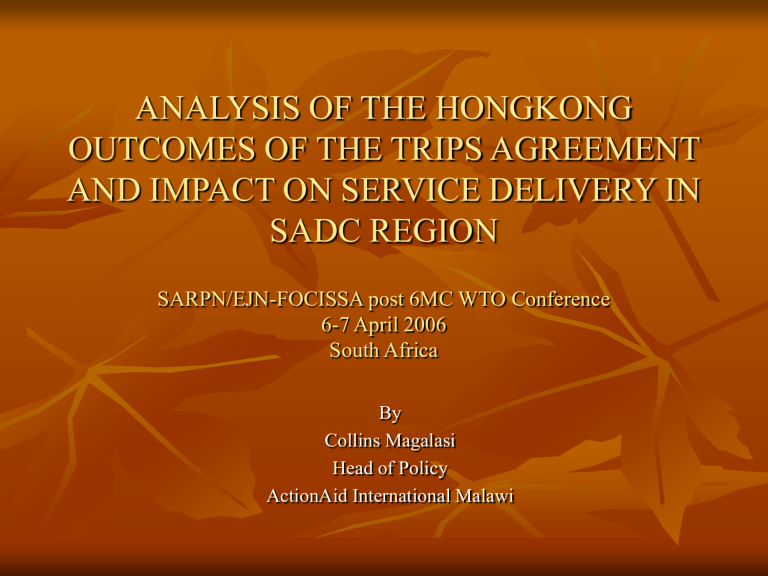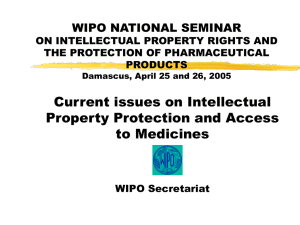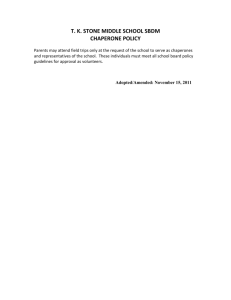Analysis of the outcomes of the TRIPS agreement and

ANALYSIS OF THE HONGKONG
OUTCOMES OF THE TRIPS AGREEMENT
AND IMPACT ON SERVICE DELIVERY IN
SADC REGION
SARPN/EJN-FOCISSA post 6MC WTO Conference
6-7 April 2006
South Africa
By
Collins Magalasi
Head of Policy
ActionAid International Malawi
Presentation Outline
Introduction
Context and Trends
What is TRIPS
TRIPS Provisions under the WTO
Issues on the Road to Hong Kong
Outcomes of Hong Kong
Implications and Conclusions
Introduction
“Affirmed the Declarations and Decisions adopted at Doha, as well as the Decisions adopted by the General Council on
1 August 2004, and (their) full commitment to give effect to them. (They further) renew(ed) resolve to complete the
Doha Work Programme fully and to conclude the negotiations launched at Doha successfully in 2006.”
Main Agenda Items for the 6MC: Agriculture, Non-
Agricultural Market Access (NAMA), Services,
Development issues, Trade Facilitation (TF) and Rules aspect of negotiations.
Public Anticipation
Underplaying of expectation
The Korea Farmers
Context and Trends (1) – Int’l Trade
Southern Africa: with 53% of population below poverty line
Declining market share: 5% in 1970s, <2%
2005
Exporter of raw materials
Merchandise: only 1.6% of global;
Declined commercial services exports from
1.35% in 1990 to 1.1% in 2005; but globally expanded by 16% to $2.1 trillion
Context and Trends (2) – HIV/AIDS
Southern Africa: 2% of world population, but with 70% of global HIV/AIDS cases
Prevalence increased form 5% in 1990 to 25% in 2004
46% of population is aged between 15-49 (age group most infected/at risk)
Varying ranges: Seychelles & Mauritius (negligible), DRC
4.9%, Botswana & Swaziland 40%
Life expectancy Seychelles 72.7 years, Zambia 33.4%
20% of children are orphans; 34% of households are childheaded (compared to 18% in West and Central Africa, 21% in Eastern Africa
LIFE PROLONGING TREATMENTS EXIST, but no access by those in need
What is TRIPS
Rights given to people over the creations of their minds.
Traditionally, the IPRs are divided into two main categories:
Copyright and rights related to copyright: The main purpose of protection of copyright and related rights is to encourage and reward creative work; and
Industrial property: This includes
Protection of distinctive signs such as trademarks and geographical indications , and
ndustrial property protected primarily to stimulate innovation, design and the creation of technology. In this category fall inventions (protected by patents ), industrial designs and trade secrets .
Critical Issues under TRIPS
Food production and using traditional agricultural practices – 1.4 billion farmers in developing countries, feeding 66% of world’s population (TRIPS extends to seed and plant varieties)
Before Uruguay Round IP laws were a matter for domestic policy
Patents block competition for 20 years and enable the patent holder to set the market price for the product.
Six multinationals control 70% of the patents held on staple food crops.
The use of patented seeds, plants and genetically modified animals would make small farmers dependent on the corporations that own the patents use of patented seeds became the norm, private corporations would dominate the world’s food supply
TRIPS Provisions under the WTO
TRIPS agreement is Annex 1C of the Marrakesh Agreement Establishing the WTO, signed in Morocco on 15 April 1994.
TRIPS are proscriptive i.e. prescribe what countries should do. The rest of the WTO rules describe what the member countries should NOT do
Part II of the agreement stipulates what member countries should do with Copyright and related rights, trademarks, Geographical Indications, Industrial Designs,
Patents, Layout – designs (topographies) on integrated circuits, protection of undisclosed information and Control of Anti-competitive practices in contractual licenses.
Part III of the agreement provides for ways and means of enforcements of IPR.
Biggest issues under TRIPS::
access to essential medicine for public health, establishment of a multilateral system of notification
registration of geographical indications for wines and spirits and others as provided for in article 23 of TRIPS agreement, and relationship between the TRIPS agreement and the Convention on Biological Diversity, protection of traditional knowledge and folklore.
The agreement states that after expiration of transitional period the council shall review implementation every 2 years (article 71.1)
1.
Issues on the Road to Hong Kong
TRIPS and Public Health
Article 31 of TRIPS agreement (O ther use without authorization of the right holder) calls for “authorization for the supply of the domestic market of the member authorizing such use.”
The Decision on Implementation of Para 6 on TRIPS and Public Health adopted in
August 2003 temporarily waived the obligations under Article 31 (f) above for exporting members supplying medicines to countries with insufficient or no manufacturing capacities.
Some countries namely Norway, Canada, and India – none in SADC) amended their domestic legislation to utilize the August 2003 decision to enhance access to generic drugs.
However no country ever used the waiver, mainly due to costly and cumbersome procedures for both producers ad users of the drugs.
The deadlines set for amending Article 31(f) were extended several times, trying to bridge the gap on critical differences i.e.
The legal form of the amendment – should it be a footnote or additional paragraphs, and
Whether and how to translate the Chairman’s statement attached to the August 2003 Decision.
The challenge and concern of many were mainly the urgency of the response.
A standoff thus insured, and the threat of delay and /or lack of access to essential medicines to address HIV/AIDS and other pandemics was obvious
2.
Issues (2)
TRIPS and Convention on Biological Diversity
Developing countries called for TRIPS to be in line with the CBD
Proposals by devg countries (for revision of TRIPS): disclosure of Source and country of origin of biological resource used in invention (IP/C/W/429); evidence of prior informed consent (PIC) under national regime
(IP/C/W/438); evidence of fair and equitable sharing of benefits (ABS) from use of genetic resources
(IP/C/W/442) and Suggestions for preventing poor – quality patents and Biopiracy (Peru, IP/C/W/441)
Developed countries wanted that the two must be interpreted as complementary and mutually supportive
Issues (3)
3. Dev’d countries (EC) submitted on geographical indications :
Negotiation issue around a multilateral register of GI for wine and spirits
Implementation issue around Extension of GI protection to products other than wines and spirits. (The implication here was that existing trademarks would not be affected, and the scheme would only be forward looking) and
The “ claw-back list” (prohibiting use of generic names i.e. those used by producers other than the rights holders in country of origin. (By implication, the 41 products whose names had so far not been protected were to become GI-protected under this “clawback” provision, with the protection retrospective so that the production of items using these names elsewhere would have to be halted) .
Note: offered by EC as offer in return for cuts in its agriculture sector; but US, Canada and others saw the proposal to have implications beyond the mandate of TRIPS Council, and effectively creating
TRIPS plus standards.
Issues (4)
4. Trips and Non Violation Complaints
Issue set out in Article 64, paras 2, 3 (Applicability of the N-V remedy in the TRIPS context) was long overdue, despite the fact that a large majority of the members (and academics) rejected the application of N-V-disputes in the TRIPS.
Moratorium for initiating dispute was in effect, but need was on maintaining moratorium in the MC6 .
Cases at hand were
the US-Cotton and EU Sugar (scheduling of commitments, status of modalities, relationship between domestic and export subsidies),
Arbitration Award on EU banana tariffs,
US-Gambling and Mexico-Telecom (mode 1, classification and scope and coverage of commitments – need for careful scheduling),
EC- Geographical Indications issue,
US-Anti-dumping cases (methodology for calculating dumping margins) etc
Issues 5
5. Extension of the Waiver
LDCs submitted joint request for extension (using Article
66.1), based on their special needs and requirements: economic, financial and administrative constraints and also need for flexibility to create a viable technological base - thus asking that TRIPS provisions should not apply until a solution is found.
The decision was fast tracked in order to avoid taking the issue to Hong Kong lest it is taken as a major concession to the LDC group when infact Article 66.1 of the TRIPS agreement provided for such extensions to be granted to
LDCs.
Issue 6
Permanent Solution to the TRIPS and Public
Health Waiver
Aug 30 2003 Decision on TRIPS and Public Health
Pressure on the WTO to simplify the rules under which governments can import, and producers export, generic copies of drugs under patent
Bird Flu
Ease the rules would encourage more producers to manufacture generic drugs under compulsory licensing.
Tamiflu, (produced by Switzerland’s Roche Holding
AG), is the only drug likely to be effective in the event of human to human outbreak of bird flu and needed to be more and widely available should the virus change to pass easily between humans
Issue 8
8.
Geographical Indications
4 propositions were made prior to the 6MC by as follows: (a) Hong Kong,
China's proposal, (b) the Joint Proposal of Argentina, Australia, Canada,
Chile, Dominican Republic, Ecuador, El Salvador, Guatemala, Honduras,
Japan, Mexico, New Zealand, Paraguay, Chinese Taipei (c) the United States and (d) the European Community.
All the proposals were different and no common grounds were reached, particularly on the following key areas:
the extent to which legal effects at the national level should be consequent on the registration of a geographical indication for a wine or a spirit in the system; the question of participation , including whether any legal effects under the system should apply in all WTO Members or only in those opting to participate in the system.
on questions of costs and administrative burdens for WTO Members, in particular for developing countries.
It was apparent that the first two above held keys to progress on the later, together with other details of the mechanism to be established.
Outcomes of Hong Kong
Agreed Before Hong Kong
Chairman of Special Session on TRIPS “despite the active engagement of delegations and the detailed discussion of the proposals, it is a matter of concern that the level of convergence in these negotiations has not significantly expanded in the period since the last
Ministerial Conference”
Outcomes cont’d
Moratorium of TRIPS:
Temporary relief granted
“It is agreed that, in the meantime, Members will not initiate such complaints under the TRIPS Agreement
On finding permanent solutions, the Ministerial merely authorized further negotiations and expect recommendations in the next Ministerial
Outcomes Cont’d
TRIPS, Public Health and Extension of Public
Health Waiver
The Ministerial confirmed amendment of TRIPS agreement to provide for expediency to respond to issues of public health
“We reaffirm the importance we attach to the
General Council Decision of
30 August 2003 on the Implementation of Paragraph 6 of the Doha Declaration on the TRIPS Agreement and Public Health , and to an amendment to the TRIPS
Agreement replacing its provisions. In this regard, we welcome the work that has taken place in the Council for TRIPS and the Decision of the General Council of
6 December 2005 on an Amendment of the TRIPS Agreement
”
Outcomes Cont’d
TRIPS and the Convention on Biological
Diversity (CBD)
No agreement was reached on TRIPS and the
Convention on Biological Diversity (CBD)
Implications and Conclusions
September 23 2005, SADC said
“The TRIPS and Public Health issue remain a priority for SADC given the
HIV/AIDS and other epidemic diseases in the region. Two years after the adoption of the decision providing for a temporary waiver, no progress has been made in finding a permanent solution as provided for by paragraph 11 of the 30
August 2003 Decision.”
Now that no permanent solutions was made at the Ministerial, it stands to maintain the status quo of our HIV/AIDS and Public Health woes that we had before 6MC.
Unless members amend domestic legislation like what Norway,
Canada, and India did, (which they declared to be costly and cumbersome procedures for both producers ad users of the drugs),
AND build strong capacity to be able to utilize the August 2003 decision to enhance access to generic drugs,
SADC and other developing countries should brace for more failures in the fight against HIV/AIDS and other epidemic diseases.
Implications and Conclusions
Need to raise local people’s awareness on the need to protect the traditional knowledge and plant and animal species.
At policy level we need to influence decision makers and researchers to ensure that farmers are protected by the government and law from the blatant, adverse and unjust effects of the WTO.
We must also encourage and lobby our governments to have the TRIPS agreement pulled out of the WTO.
6MC can be said, without question, therefore to be an expensive way of declaring the developed countries’ unwillingness and/or inability to find solutions to the woes of poor countries






